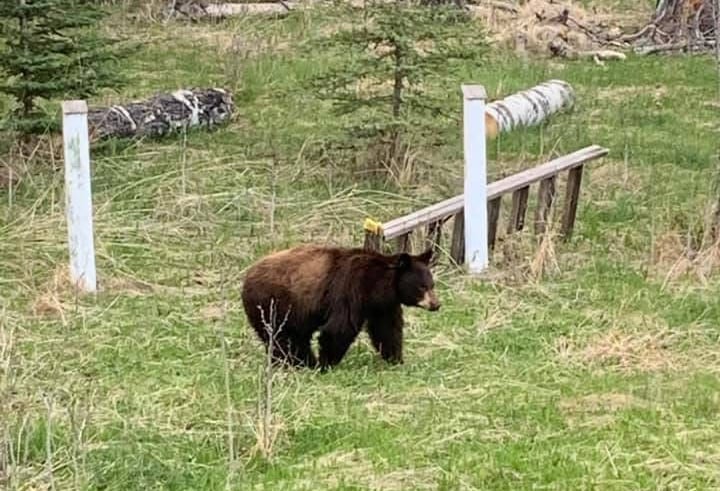Like anyone who is a fan Banjo-Kazooie or Winnie the Pooh knows bears love honey, but for Mountain View County beekeepers, that famous sweet tooth is more of a cause for concern than a cute craving.
Simone and Stephen Dold run S2 Apiary in the central Alberta village of Burberry, located about 107 kilometers northwest of Calgary, in the foothills of the Rocky Mountains.
Since the couple took up beekeeping in 2017, they've learned first-hand that bears simply can't stay away from their hives.
The bear's most recent visit to the apiary was caught on camera earlier this month, when a grizzly bear made a late-night visit to the apiary on October 2.
“In this case, he kind of hit some sawhorses that we had near our apiary and did a couple of laps around the apiary, but he couldn’t figure out how to get through the electric fence,” Stephen said.
Mountain View County beekeepers Simone and Steven Dold often have to deal with intruders trying to steal their hives, like this grizzly bear. The brazen villain tried to commit a night robbery, but did not get the honey he was looking for.
Stephen called visiting bears “one of the realities and nature of being in this part of the country.”
Living in bear country means that all residents must take special precautions, especially those with bear magnets such as beehives on their property.
“In the spring, summer and fall, we use properly installed electric fencing around our bee yards, which has proven to be the most effective deterrent to bears,” Simone said.
“We also try not to feed the birds, leave out compost or expose them to bee equipment or feed that might attract them.”
Stephen said that whenever their hives are invaded by bears, they play it safe by clearing out the entire bee yard, “just to make sure it doesn't come back and visit the same place because… if they find a source of food or food, they'll come back.”
Bear awareness and vigilance prevented S2Apiary from suffering significant losses at the hands of bears.
“As soon as they come into contact with the electric fence, they learn,” Stephen said.

With their beekeeping business just one of countless agricultural businesses in grizzly bear territory, the beekeepers stressed the importance of alerting bears under all circumstances in rural Alberta.
“Beekeepers can lose entire apiaries, and farmers can lose calves, lambs and poultry to bears. We have a lot of families in this area with small children and they also need to remain vigilant when outdoors, especially at dawn and dusk,” Simone said.
She said they will be sure to let potential visitors know in advance about recent bear sightings on the property in case they change their minds about coming.
Grizzly bear range is expanding across Alberta, minister says
The bearberry is where grizzly bears are expected to be present, but Alberta Forests and Parks Minister Todd Loewen told CBC News the endangered species is “spreading into areas where it hasn't been before,” including in the easternmost parts of Mountain View County and further east in central Alberta than it has been for years.
“WWe're definitely seeing an increase in the distribution of grizzly bears across the province, as well as an increase in their density,” Lowen said.
He attributed this increase in distribution to provincial recovery planwhich includes monitoring grizzly bear populations, working to minimize the risk of human-wildlife conflict and human-caused grizzly bear mortality, and raising awareness about proper coexistence with bears.
“I think it's clear that the recovery plan is working and the grizzly bear population is growing,” Lowen said.
“But at the same time we are concerned negative interaction between grizzly bears and humans this is happening.”
Lowen pointed to Alberta's BearSmart program, in which the province works with municipalities and local residents to provide education and information about coexisting with bears.
Mountain View BearSmart is among the organizations participating in this network. The organization monitors sightings of bears and other large predators in Mountain View County and neighboring Clearwater County, and offers resources and events to promote peaceful coexistence of wildlife.








